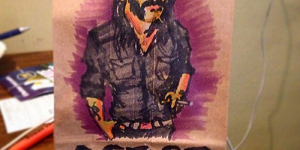The 10 most memorable band breakups
by Anne T. Donahue
August 10, 2010
While their music has defined years, eras or even lifetimes, the legacy of certain groups are also made up of their their demise. Their breakups maintaining just as much relevance as their lyrics and melodies. Here are 10 of the most memorable band breakups in music history.
Oasis
Since their evolution from their days as The Rain, the Gallagher brothers earned just as much attention for their temperaments and inter-band dynamic than they did for their musical credibility. Between quick tempers, substance abuse and onstage antics (that quickly evolved into onstage and offstage violence), Oasis began to crumble under the strain of Noel and Liam’s combative personalities. Though they continued to record and tour while fans and tabloids endured their turbulence and instability, Noel made his official departure from the band following yet another Gallagher dispute, leading to the cancellation of the evening’s show as well as their entire European tour, leaving the manager to announce that the group “does not exist anymore”.
The Beatles
Though many blame Yoko, the band’s differing personalities or the effects of conflicting creative evolutions, the more time that passes since the breakup of The Beatles, the more evident it is that group’s demise was not the result of any one factor. Following the death of Brian Epstein in 1967, the band was plunged into financial and legal turbulence. Later, as creative visions changed and solo projects began taking precedence, the group reached a boiling point – leaving Paul McCartney to surprisingly announce the breakup of The Beatles while doing press for his solo debut, McCartney in 1970.
The Smashing Pumpkins
To claim that Billy Corgan has an artistic temperament or an unlimited ego is to put it lightly – especially since following his announcement of The Smashing Pumpkins’ demise in 2000, the singer-guitarist went onto accuse the band’s former bassist of being a “mean-spirited drug addict” and to blame the group’s breakup solely on guitarist James Iha. In a blog that claimed absolute truth in 2004, Corgan vowed to “stop protecting” his former bandmates and vowed to continue on with the Pumpkins – which he has, despite the fact the group now boasts a brand new lineup with only Billy Corgan reigning as the original member.
The Supremes
Darlings of the Motown boom of the 1960s, Diana Ross’ placement into the spotlight led to the unhappiness of co-founder Florence Ballard who grew increasingly depressed as her role evolved from the band’s co-founder to relative backup singer. Eventually forced out of the group completely, she was replaced by Cindy Birdsong in 1967 (which went unnoticed by fans), leaving Ross’ position as the group’s leader cemented – especially after she was given individual credit on the band’s collaborative records. Ross was eventually replaced by Jen Terrell as she pursued a solo career, but the group eventually lost momentum without the diva (who shoved Mary Wilson on a TV special in 1983) and disbanded completely, with Florence Ballard dying penniless in 1974.
The Mamas and the Papas
Though the band formed in the midst of the 20th century’s most turbulent era, the inner-workings of the Mamas and the Papas still remain one of the most controversial and relevant group dynamics in music history. Following an affair between Michelle Phillips and co-founder Denny Doherty (which spawned the song, I Saw Her Again Last Night), the band re-grouped and enjoyed worldwide success amid avid drug and alcohol abuse, but after (Mama) Cass Elliott initially quit the band after hearing comments made by John Phillips, the group returned to record their fourth and fifth albums only due to contractual obligations, leaving the last record to fail and release the group to pursue solo endeavours.
The Eagles
While most bands endure tension and behind-the-scenes disagreements naturally, The Eagles went so far as to display their prominent hostility onstage, as mounting conflict led to Bernie Leadon infamously pouring his beer over Glen Frey’s head in 1975. However, despite the group’s combative dynamic, they managed to record three more albums, though the band’s 1980 Long Beach concert was dedicated entirely to the running commentary of Frey and Don Felder, who spent the show’s duration describing the beatings they planned to administer to one another backstage. However, with the departure of Felder and his subsequent lawsuit in 2001, the band has continued to tour and record, maintaining a loyal and widespread fanbase throughout the globe.
Blondie
While Debbie Harry undoubtedly carved a path for new generations of female rock musicians, it was the press’ constant focus on the singer that led to conflict within the group, as Blondie the band became overshadowed by Harry’s presence entirely. Following Chris Stein’s diagnosis with pemphigus, the group was sent a letter informing them of financial turmoil, and the band soon learned that their management had essentially cleaned them out. In addition to drug use, Stein’s worsening condition and pre-existing tensions within the group, Blondie chose to disband in 1982, cancelling their tour plans and leaving Harry and Stein to combat both his illness and substance addiction which led to Harry’s stress-fuelled breakdown.
The Sex Pistols
Boasting notoriously volatile personalities and hardcore drug addictions, The Sex Pistols have cemented themselves as one of punk rock’s most integral musical acts – as well as one of the most doomed. While the band had already gained recognition for their controversial prose and hyper-aggressive vibe, it was on their US tour that tensions mounted, as manager Malcolm McLaren purposely booked less-than-ideal venues to provoke hostile situations that led to several hospital visits for Sid Vicious. While Vicious goaded on audiences and indulged in physical altercations (while coming down from heroin highs), Johnny Rotten felt increasingly isolated, leaving the band’s last show with the words, “ever get the feeling you’ve been cheated?”, only to be stranded in LA before announcing the band’s breakup in 1978.
Fleetwood Mac
A band as famous for its love triangles and drama as it is for its lyrical imagery and lasting relevance, following the divorce of John and Christine McVie and the breakup of Stevie Nicks and Lindsey Buckingham, Fleetwood Mac became a breeding ground for conflict and subsequent hurt. As pressure mounted to record an album as popular as their 1975 self-titled LP, tensions rose as the band’s prevalence and wealth fuelled drug and alcohol addictions, leading to the recording of Rumours which reflected the turbulence endured by the group. However, despite their unconventional inner-workings, it wasn’t until 1987 did Buckingham officially depart following a memorable incident between he and Nicks, leaving the band to continue pursuing their own solo endeavours.
The Pixies
Though most bands pine for the attention The Pixies were on the cusp of receiving, it was the dynamic between Black Francis and Kim Deal that led to the group’s hiatus after the unbridled success of 1989’s Doolittle. With Deal having at one point thrown her guitar at the singer onstage – and being nearly fired as a result – the band continued to tour, though at their 1989 homecoming concert in Boston, exhaustion took its toll as Deal performed visibly drunk and Joey Santiago smashed up his instruments, storming offstage. Following Deal’s formation of The Breeders, The Pixies recorded two more albums, but later broke up in 1993 after Francis announced it on the BBC and notified the band via fax of their official demise.
Tags: Music, Featured, Fleetwood Mac, Oasis, Sex Pistols, The Eagles, the Pixies





